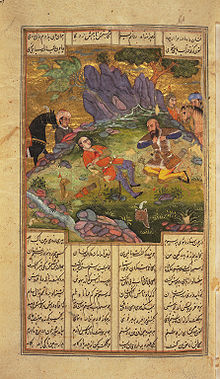
Back رستم Arabic Rüstəm AZ Rostam Catalan Rostam CEB ڕۆستەم CKB Rustam Czech Rostam (Schāhnāme) German Rustem DIQ ރުސްތުމް DV Ροστάμ Greek
This article needs additional citations for verification. (April 2014) |
Rostam | |
|---|---|
رستم | |
 Rostam mourning Sohrab. Persian miniature. | |
| Born | |
| Died | |
| Cause of death | With the conspiracy of his half-brother Shaghad, he fell into a well full of poisoned spears and was killed in Kabulistan. |
| Other names | Rustam Rustem |
| Known for | Seven Labours Battle with Sohrab Battle with Esfandiyārkilling Demon Albino |
| Spouse | Tahmina |
| Children | Sohrab Faramarz Siyâvash (adopted son) Banu Goshasp (In Banu Goshasp Nama) |
| Parents | |
| Family | Sām (grandfather) Zavara (brother) Shaghad (half brother) |

Rostam or Rustam (Persian: رستم [rosˈtæm]) is a legendary hero in Persian mythology, the son of Zāl and Rudaba, whose life and work was immortalized by the 10th-century Persian poet Ferdowsi in the Shahnameh, or Epic of Kings, which contains pre-Islamic Iranian folklore and history. However, the roots of the narrative date much earlier.
In the Shahnameh, Rostam and his predecessors are Marzbans of Sistan (present-day Iran and Afghanistan). Rostam is best known for his tragic fight with Esfandiyār, the other legendary Iranian hero; for his expedition to Mazandaran (not to be confused with the modern Mazandaran Province). He is also known for the story of his Seven Labours.
Rostam was always represented as the mightiest of Iranian paladins (holy warriors), and the atmosphere of the episodes in which he features is strongly reminiscent of the Parthian Empire.
He rides the legendary stallion Rakhsh and wears a special suit named Babr-e Bayan in battles.